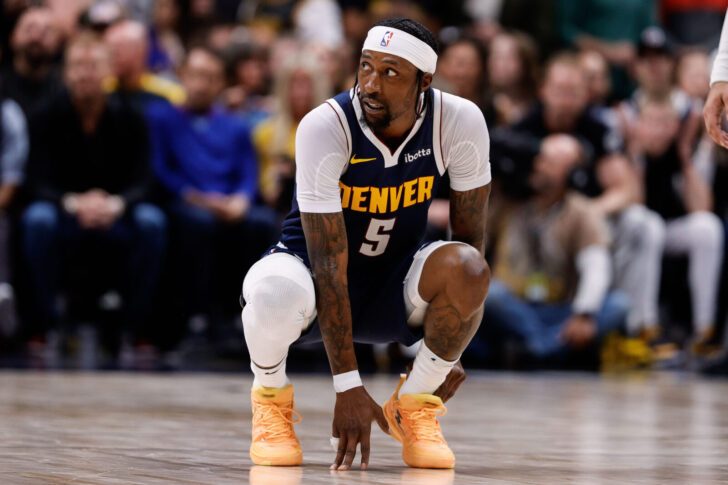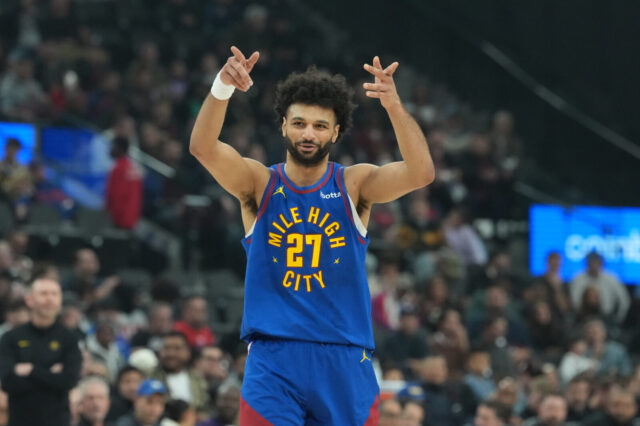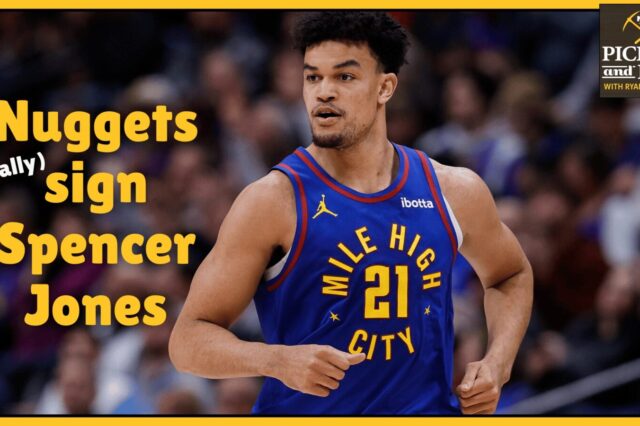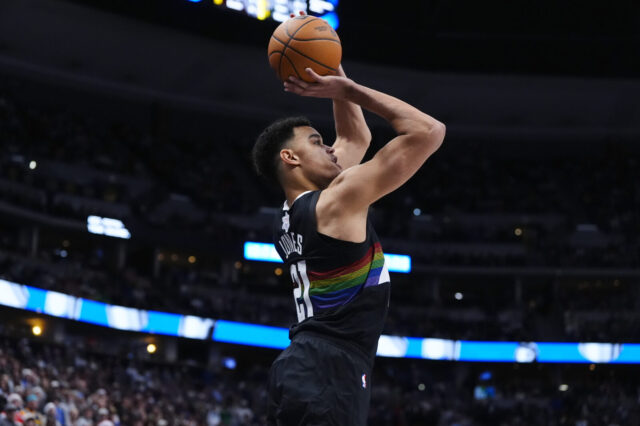After just over 48 hours to settle down and process exactly what happened to the Denver Nuggets in the playoffs, I’ve come to an important realization:
The entire organization, from top to bottom, remains championship caliber.
With the Minnesota Timberwolves set to tip off against the Dallas Mavericks in Game 1 of the Western Conference Finals tonight, Nuggets fans (and players, coaches, and executives) are understandably frustrated. The Nuggets should be there. They were up 20 points in Game 7. They had done the hard work. All they needed to do was not screw it up.
Unfortunately, that’s exactly what happened, and the resulting shockwaves from perhaps the worst Game 7 collapse in NBA history have left the organization and the fans reeling.
In situations where shockwaves hit, it’s easy to overreact. I mean, is it ever overreacting when you lose in that fashion? Perhaps not, but here’s a key factor to remember: the Nuggets won 57 games, tied for the second most in the NBA and had the fourth best Net Rating in the regular season. The Timberwolves? They won 56 games and had the third best Net Rating in the league.
These teams were even strength. They were in the same tier. They were both championship caliber this year. Only one had the opportunity to move on to the Conference Finals because they ended up on the same side of the bracket. Had the Nuggets met the Timberwolves in the third round instead of the second round and lost in similar fashion, would there be less widespread panic or more? Who knows.
The point is, the Nuggets, as currently constructed, were close. Very, very close. Had they gotten through the Timberwolves, would they have won the championship? Maybe. Maybe not. The Boston Celtics are really good, and it’s possible that other teams could have knocked off Denver as well.
So, when a team is very, very close to winning a championship, is it a smart reaction to break up a championship core? Probably not.
The Nuggets enter this year at a bit of a crossroads. There are several players the Nuggets have to make short and long term decisions on.
Kentavious Caldwell-Pope is the most pressing concern. He started 76 games for the Nuggets and played over 2,400 minutes. He was available as a 3&D option in the regular season. In the playoffs, Caldwell-Pope shot below his standard, and he was unable to slow down Anthony Edwards in a meaningful way without the Nuggets sending double teams. Ultimately, it was Christian Braun that proved to be the better matchup on the athletic Edwards, which puts Caldwell-Pope’s contract into perspective.
Caldwell-Pope’s $15.4 million player option will almost certainly be declined, allowing him to explore free agency. The Nuggets starting shooting guard will have a litany of suitors, and that may drive the price up closer to $18 to $22 million per season. A contract of average annual value of $20 million would put him in the same range as Josh Hart, which feels about right. Other teams might offer more to lure him away from the Nuggets. Can the Nuggets get a hometown championship discount? Mike Conley just signed an exceedingly friendly contract extension with the Timberwolves worth roughly $10.5 million per year. He’s the fifth starter in Minnesota. Caldwell-Pope is the fifth starter in Denver. Maybe they could find a way.
It comes down to whether the Nuggets feel like they can afford it and whether Caldwell-Pope is “necessary” to Denver’s success. With Christian Braun, Peyton Watson, and Julian Strawther already on the roster on rookie contracts, the Nuggets might decide they can afford to let Caldwell-Pope walk and piece together his minutes with younger, more affordable players. That’s all well and good, but the Nuggets would be losing 2,400 regular season minutes and someone that played 40 minutes in the most important game of Denver’s season this year. The young guys can’t be expected to fill that gap, and more importantly, the Nuggets can’t let a valuable player walk away without any compensation. Perhaps they could negotiate a sign-and-trade, but that seems like a last resort option rather than a tangible solution.
So, Denver should look to retain Caldwell-Pope. That has been established.
There are financial ramifications to that decision involving the super tax apron. The Nuggets are currently approaching that number, and if they retain Caldwell-Pope for roughly $20 million per season, I expect them to exceed it rather easily.
The penalties for exceeding the super tax apron in the 2024-25 season are as follows:
- No access to the $5 million taxpayer midlevel exception
- Teams cannot use a trade exception generated by aggregating the salaries of multiple players
- Teams cannot include cash in a trade
- Teams cannot use a trade exception generated in a prior year
- First-round picks seven years out are frozen (unable to be traded)
- A team’s first-round pick is moved to the end of the first round if they remain in the second apron for three out of five seasons
That’s a lot of penalties. It’s why so many teams are cutting costs and trying to save money. The Nuggets don’t really have that luxury with championship pressure as high as it is. They have to spend during the prime years of Nikola Jokic, which won’t last forever and are important to capitalize upon.
So, the Nuggets might decide to relieve some of the financial pressure by trading Michael Porter Jr. instead.
Porter was Denver’s second most consistent player during the regular season, playing 81 out of 82 games, scoring 16.7 points per game on 40.7% from three, and grabbing 7.0 rebounds per game, the second most on the team behind Jokic. His contributions were important in raising Denver’s regular season floor, and when he wasn’t on the floor, the Nuggets often struggled. That effectiveness extended into the first round of the playoffs when Porter had the best series of his career against the Los Angeles Lakers.
Then, this past series happened, and Porter put up the following point totals: 20, 9, 21, 4, 6, 8, and 7. Porter averaged just 10.7 points per game against the best defense in the NBA, shooting 32.5% from three. If the Nuggets simply had a better Game 7 from Porter, let alone a better series, the team might still be playing.
It’s not fair to place that entire burden on Porter. Other players struggled, namely Jamal Murray. The difference between the two is how essential they are and how replaceable they are. The Nuggets know Murray’s importance, despite his struggles with health and conditioning throughout the season. With Porter, he’s involved in fewer offensive actions and bears a heavier burden defensively. In terms of play style and importance, he’s smack dab in the middle of a 3&D wing and a more versatile scoring forward. The Nuggets might believe they can find that skill set for a cheaper price than the $115 million that Porter’s due over the next three years.
And yet, the possibilities involving a Porter trade are mostly subpar. Does a package of De’Andre Hunter and Bogdan Bogdanovic from the Atlanta Hawks change anything for the Nuggets? What about Kyle Kuzma and Marvin Bagley III from the Washington Wizards? Perhaps Andrew Wiggins and Kevon Looney from the Golden State Warriors? Do those deals move the needle? Some of them sound nice in theory and could be justified, but the Nuggets lose some offensive punch if they give up Porter. It also takes two to tango, and Porter’s contract would be seen as difficult to absorb by almost every team.
No, it probably makes more sense for the Nuggets to maintain the status quo.
These are only some of the questions the Nuggets will be faced with this offseason. Reggie Jackson has a player option, and the Nuggets may not have the right backup point guard on the roster. Denver has the 28th pick in the 2024 NBA Draft. Can they justify adding another young guy when there’s already a litany of young players on the roster struggling to earn time and gain favor from Michael Malone and the coaching staff?
Jamal Murray is up for a contract extension. He will be expecting the four-year, $204 million max extension available to him this offseason. Murray hasn’t made an All-Star team, but his importance to the Nuggets remains clear enough that they will probably offer that contract. About $50 million per year would put Murray in the same ballpark as Joel Embiid, Bradley Beal, and Kawhi Leonard. That’s an interesting group of injury prone players. Hopefully Murray isn’t going down the same road.
Aaron Gordon is also up for a four-year, $140 million contract extension, a fair valuation for a veteran that’s on the fringe of the All-Star conversation. About $35 million per year would put Gordon in the same ballpark as Porter Jr., Pascal Siakam, and Jrue Holiday, which feels about right as well for what Gordon provides.
The more money the Nuggets commit to their roster around the super max extension that Jokic has signed, the harder it will be to fill out the roster. These might be important conversations to have in the future, but that’s why Nuggets general manager Calvin Booth has put such a premium on young players on rookie scale contracts. If two or three of Christian Braun, Peyton Watson, Julian Strawther, Jalen Pickett, or Hunter Tyson truly break out over the next two years (i.e. become starter quality) then it will be easier to retain as much talent as possible and recycle talented players around Denver’s formula of Jokic and Murray.
Perhaps that plan will end up being a good one going forward.
Perhaps the Nuggets won’t have enough resources to fill out their roster as they hoped for.
Whatever the case, the Nuggets have some decisions to make this offseason. Fort their sake, and for the sake of Nuggets fans, I hope they try everything to keep this team together. It’s championship worthy. While the cards didn’t break right for them this time around, that doesn’t mean they will fail going forward. This is a great team, one that could get even better if the young guys figure it out too.



